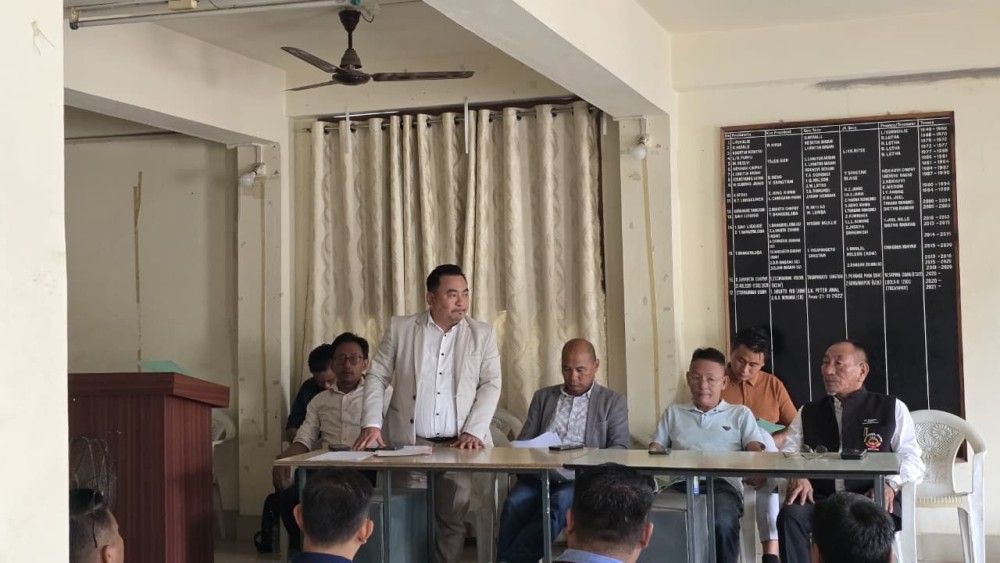Members of NSF, NCD and others during a consultative meeting held at the Naga Council Dimapur Hall on November 3. (Photo Courtesy: ILRC-NSF)

Dimapur, November 3 (MExN): The Inner Line Regulation Commission (ILRC) of the Naga Students’ Federation (NSF) today held a consultative meeting at the Naga Council Dimapur (NCD) Hall to deliberate on the effective implementation of the Inner Line Permit (ILP) and the protection of indigenous Naga rights.
To this end, the gathering collectively agreed to work in closer coordination with government departments and civil society organisations to safeguard indigenous rights, promote awareness of the ILP regulation, and ensure its effective and transparent implementation across the State.
The meeting reaffirmed the shared commitment to protect Naga identity, land, and heritage in accordance with the Bengal Eastern Frontier Regulation, 1873, and the constitutional safeguards under Article 371(A), informed a press release from the ILRC.
Addressing the gathering, NSF President Mteisuding Zelaing reiterated that the ILP regulation remains one of the Federation’s top priorities and stressed that its ILRC was formed to strengthen its enforcement.
Stemming from the Bengal Eastern Frontier Regulation (BEFR), 1873, the system was created to safeguard the rights and interests of the indigenous Naga people, he noted.
Pressing challenges: Illegal entry and low public awareness
ILRC member Kelhouniezo Yhome, meanwhile, stressed the importance of upholding the identity, culture, and integrity of the Nagas. Recalling the NSF’s historical role since its formation in 1947, he reminded the audience that as early as 1975, the Federation had recommended that all State quotas and benefits be reserved exclusively for indigenous Nagas.
Yhome highlighted Dimapur as a key area of concern due to the high influx of outsiders and urged the NCD and GB’s Union to remain vigilant.
The ILRC member also pointed out what he termed “two pressing challenges” under the ILP system – the unchecked entry of illegal migrants and the lack of public awareness. Citing Article 371(A) of the Indian Constitution, he reiterated that non-Nagas are not permitted to own land in Nagaland and called on all civil bodies and student organisations to work in unison to ensure strict enforcement.
Expediting boundary demarcation
Likewise, Hukavi T Yeputhomi, another commission member, stressed that while the BEFR, 1873, remains a vital safeguard for the Naga people, its implementation has been weakened by low awareness and the absence of a clearly demarcated boundary between Nagaland and Assam.
He called for urgent action from both the government and local authorities to expedite boundary demarcation and strengthen enforcement mechanisms, particularly in border areas where Village Chairmans and GBs have a greater role to ensure proper implementation of the ILP in Nagaland.
During the open discussion, participants raised several key points, including the empowerment of local Councils and GBs for effective ILP enforcement in Dimapur.
The necessity to regulate ILP holders residing within Dimapur, beyond tourists and daily visitors, was also discussed, along with the importance of reclaiming local economic control and strengthening Naga ownership in the business sector.
The meeting also mooted the creation of a centralised indigenous certificate database to ensure authenticity and prevent misuse, as well as further streamlining and improvement of the ILP online portal for better management and transparency.
Apart from the NSF and NCD, representatives from GB’s Union (Sardar), Dimapur; Dimapur Urban Council Chairman Forum; and Dimapur Naga Students’ Union (DNSU) attended the meeting.






